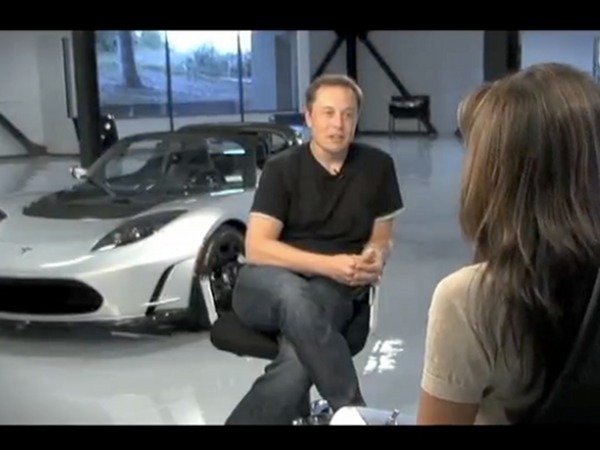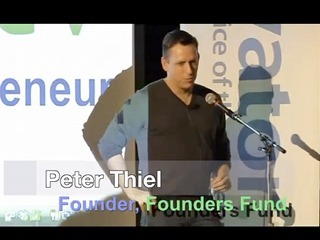p>At VatorNews, we believe in building on the shoulders of giants. That’s why we’ve dedicated years into building up a collection of “Lessons learned” videos. (See our Lessons Learned archive) This year’s list consists of some of the high-profile entrepreneurs making news this year, from Zynga’s Mark Pincus to Zappos’ Tony Hsieh to Twitter’s Dick Costolo to Tesla Motor’s Elon Musk.
We hope these help you become a better entrepreneur in the new year.
Elon Musk: Work harder than others
How does Elon Musk pull off being the chief executive of both Tesla Motors and SpaceX, chairman of SolarCity, philanthropist through his Musk Foundation, which recently provided aid to the Gulf Region, and father to five boys? He works twice as hard as the average guy.
If other people are putting in 40 hours in a week, and you’re putting in 100, you will achieve in four months, what it takes them a year to achieve. That’s the type of work ethic an entrepreneur needs to have, according to Elon.
Lesson: Entrepreneurship takes work.
See video here.
Why PayPal spawned great entrepreneurs
At the Vator’s Splash event in September 2010, Peter Thiel (co-founder of PayPal and Founders Fund) gave his version and post-morterm of PayPal. Many people, including myself, refer to PayPal as the quintessential example of a company that pivoted before pivoting and agile development were popular movements.Scott Banister, an early PayPal investor, told us that PayPal’s original plan was thrown out the window. “PayPal had probably 40 people before the full transition from Palm Pilot payments onto eBay payments,” he said. Eric Ries puts it this way: “A good example is Paypal realizing that their customers were gravitating to the email-payments part of their original solution, and ignoring the complex PDA-based cryptography solution.”
Many people also have their own versions of PayPal’s early days and why it became the home to so many successful entrepreneurs. The reason many give is that PayPal’s challenges were significant.
Lesson: Pivoting is a good thing.
See video here.
Failure is a pre-requisite to learning
Eric Ries has quickly emerged as one of the greatest teachers of the ‘lean startup’ movement in Silicon Valley. In fact, Eric coined the term. While there have been proponents of such methodologies, such as Steve Blank, serial entrepreneur, professor at Stanford and Berkeley, and author of The Four Steps to the Epiphany, as well as Donald Reinertsten, who authored The Principles of Product Development Flow, Eric is bringing more awareness to their teachings. With his own entrepreneur war wounds, he’s equipped to galvanize a following, and he’s already uniting many who want to have a shot at success, and feel that the traditional “swing-for-the-fences” mentality to achieve it is either outdated, or out of their reach.
Lesson: Failure is part of the entrepreneur’s journey.
See my series with Eric here:
Eric Ries and his lean startup awakening
Eric Ries on pivots and continuous deployment
Eric Ries on his lean startup methodology
Eric Ries on why failure is a prerequisite to learning
Twitter CEO Dick Costolo on IPO exits
Twitter CEO Dick Costolo shared his lessons and advice at Vator’s Splash event in late September (days before he was appointed CEO). Prior to Twitter, Dick founded Feedburner, which he sold to Google for $100 million.
Lesson: 1) Have a voice (be unique) 2) Have a clean term sheet 3) Don’t think about exits 4) Think long term 5) Launch late to launch often 6) Don’t revisit decisions.
See video here.
Zynga CEO Mark Pincus on scaling a business

As I mentioned in my introduction to Zynga CEO Mark Pincus keynote at the Vator Splash event, he is not an accidental entrepreneur. This is a rare entrepreneur who’s had, for the 10 years I’ve known him, a whiteboard accessible throughout his entire house. This is a person who’s constantly been thinking and dreaming up new ideas. He’s had successes and failures. But he kept moving forward, like a true entrepreneur with a vision and persistence. To that end, his lessons about scaling a business are invaluable.
Lesson: 1) Fail fast 2) Set goals 3) Control your identity 4) Find your mission 5) Grow great people 6) Make them CEOs 7) Embrace metrics and process 8) Keep your eyes on the prize
See video here.
Zappos’ Tony Hsieh on how to build a billion-dollar culture

Tony Hsieh, Zappos CEO, received a standing ovation for his presentation at Vator Splash May, for his lessons on building his company. The key to success is focusing on culture.
Lesson: Culture is everything, or almost everything.
See both videos:
Part II: How to build a billion-dollar-company culture
Part 1: Tony Hsieh’s standing-ovation speech
Mike Maples on nature vs nurture

While there are many lessons entrepreneurs can learn to mitigate risk in the future and become better entrepreneurs, the true outliers are products of nature vs nurture. At least, that’s what one prominent super angel believes. “I think entrepreneurs are more born than made,” said Mike Maples, founder of Floodgate, a Silicon Valley super angel firm, with investments in some high-profile private companies, including Chegg, Twitter and Digg. Some entrepreneurs have this MacGyver tendency, said Mike, referring to the secret agent Angus MacGyver, who managed to overcome all obstacles, like escaping from prison or making a bomb out of a cactus plant.
Lesson: Entrepreneurs are more born than made.
See video here.
Smule’s Jeff Smith on having your customers be your marketers
If there is one overriding lesson about viral marketing, it is that the product is itself the marketing. Without a great product, few would care to share with friends and thereby ignite the exponential growth in user adoption that most successful “social” media and network companies rely on Jeff Smith, CEO and co-founder of Smule, expressed this in spades during his time onstage at Vator Splash Feb.
Lesson: The product is the marketing.
See video here.
Steve Blank on why entrepreneurship is a faith-based endeavor
I first saw Steve Blank at a TIE conference in Silicon Valley last year. At the time, I assiduously wrote everything he had to say about customer development methodology when building a startup. After all, I am an entrerpeneur. As the author of “The Four Steps to the Epiphany,” Steve has been instrumental in ushering a new way of thinking about building companies. Along with his student Eric Ries, who has become a leading evangelist of the “Lean Startup” movement (Eric coined that term), the two are shaping a whole new generation of startup entrepeneurs, who are dismissing the old way of building companies and embracing and applying a more prudent, customer-oriented, and learning-based methodology to their startups.
Lesson: Entrepreneurship is a journey full of discoveries.
See video here.
Pete’s wicked ale inventor on accidentally creating a beer business
“I didn’t start the company to make beer,” said Pete Slosberg. Now that sounds a bit ironic considering that Pete went on to make one of the more popular beers today. Peter Slosberg is the creator of Pete’s Wicked Ale and Pete’s Brewing Company, the maker of the popular microbrew beer. The business first started when Pete, who didn’t drink while in college, began making his own wine back in 1979 as a hobby. After realizing that making wine was a long and arduous process, he tried his hand at making beer.
Lesson: Sometimes, you have to go with the flow.



























